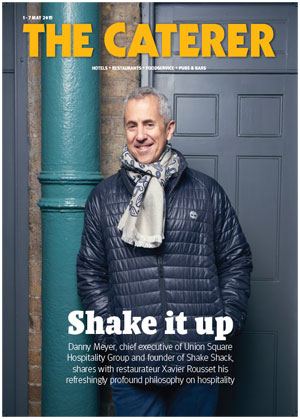Danny Meyer: seven secrets of his success
What:
Read the full Rousset Interview in this week's The Caterer magazine, out 1 May 2015.Get your copy here!
1. Good food is not enough
"No one's going to come back to your restaurant just because you have good food, and they definitely won't come back if you don't," Meyer explains. "Let's say there are 50 other places whose food is just as good yours - that's where hospitality comes in."
2. Design doesn't make or break a restaurant
"There are many restaurants where what's on the plate and what's in the glass and how good the welcome is matter much more. That doesn't mean that good design can't improve a restaurant, but we've all had wine where the label was better than the liquid in the bottle, and so it can be with restaurant design.
"I would start off with making the experience great, even with a modestly designed restaurant, and once you have a following you can always make the decor nicer.
"That doesn't mean you shouldn't care about the design - we put a lot of thought into the design of Shake Shack - and I think there's a correlation between higher-revenue restaurants and those that care about design. However, it's still not as important as the product and the quality of the hospitality."
3. The process of keeping happy staff is like being a winemaker
"There are four processes involved, three of which you can control," says Meyer. "You can control the rootstock and where you plant it - the terroir. So, did you hire the right people? Because the wine's never going to taste any better than the worst rootstock, and we're never going to do any better than the worst person we hired.
"The culture is incredibly important. Let's say we hire the right person, but the culture, the way we do things in the restaurant, is toxic - that employee's not going to thrive.
"The third thing is training the vines. So get the right rootstock, keep the soil healthy and train it.
"Lastly, we cannot control the vintage or the climate, but a good winemaker makes the best wine, even in a bad year, and a good restaurateur has the capability of having the best staff, even when the economy's not great."
4. Team first, customers second
"Unfortunately, in many societies, the restaurant guest is the master and the person in front of house is the servant.
"Therefore, when we hire people, we really make it clear that hospitality is our game. The first stakeholder that receives our hospitality is our own team, and that means you will be responsible for us, for how well you take care of each other.
"If we can start a virtuous cycle by uplifting human energy among people who work there, we believe that becomes infectious and then everyone wants to take good care of our guests.
"I can't do that overnight, but I can tell you, having been in the restaurant business for over 30 years, that putting your own team first and putting customers second enables you to attract people who are able to break out of that master/servant relationship, because if their own boss is empowering them to use their hearts and minds to do great things for each other and for the customers and the community, it's a more highly respected pursuit."
5. Location is not crucial to a restaurant's success
"I believe context is more important than location. Restaurants can open in locations that stores couldn't. But in the context of a neighbourhood in the making, a restaurant can help a location as much as a location can help a restaurant."
6. Know your business to get the benefits of reviews
"The problem with so many reviews, whether they're from amateurs, bloggers or professional media, is that you're picking up so much information that it's very, very easy to pick up static.
"The key thing for a restaurateur is to know your business well - it's important to listen and look for patterns. So, in other words, if I read 50 things, whether they were by an amateur or a professional, if one of them says 'I love everything about the restaurant except the uniforms', that's OK.
"If four of them say it, listen carefully."
7. Pretend the food is free
"If you come to my restaurant, at its core is the base transaction of 'you give me money and I give you food'.
"However, we try to teach our staff that if somebody comes in and orders a cheeseburger or a milkshake or a Cumberland sausage or an ale, pretend the food is free, and pretend that what they're really paying you for is the hospitality. How did you make each other feel, and how did you make them feel?
"That's what's going to make people come back."
Read the full Rousset Interview in this week's The Caterer magazine, out 1 May 2015.Get your copy here!








